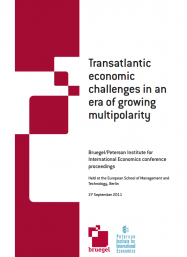
Transatlantic economic challenges in an era of growing multipolarity

Excerpt from the Opening Address of Vitor Gaspar
In 1950, Europe, the United States and other Western Offshoots (using the expression of Madison) represented about 57 percent of World GDP – at the time the 27 member states of the European Union represented 28.2 percent of World GDP and the United States 27.3 percent. The Transatlantic dominance was even more pronounced if measured by shares in world trade or finance.
In terms of population the shares were much lower at 14.8 percent and 6.2 percent respectively, reflecting the relative patterns of prosperity and deprivation around the world.
It is impressive to compare these indicators with the prospects for 2050. Such long term perspective suggests a profound long term change going forward. In the century from 1950 to 2050 the share of Europe and European Offshoots will have fallen from about 57 percent to about 40 percent of world GDP. Western Europe will have fallen from 26.2 percent to 17.9 percent and the US from 27.3 percent to 19.6 percent. In the same period Asia will have moved from about 18.4 percent to 36.5 percent. To a very large extent these trends reflect the reversal of the Great Divergence that took place from the mid-1700s to the mid-1950s and led to dominance of World Trade and Finance by Europe and European off-shoots. The shifting patterns of power going forward are clear. Effective cooperation and coordination in the global economy require that governance of multilateral organisations and groups adapts to these changing patterns. The process of transition may be characterised by growing multipolarity as in the theme for this conference. There can be no guarantees that the transition will proceed smoothly. A cooperative and multilateral approach (that I am tempted to label the European approach) is only one possible way to conceive the transition. But, in whatever way it occurs, the transition at global level will have profound effects on transatlantic political, economic and financial relations. Global transition is a powerful undercurrent that persistently influences transatlantic relations.
- Issues:
- Economics, Global and Domestic Governance
- Regions:
- Europe, North America
- Country:
- United States
- Year Published:
- 2011
- Institutions:
- Peterson Institute for International Economics (PIIE), Bruegel

